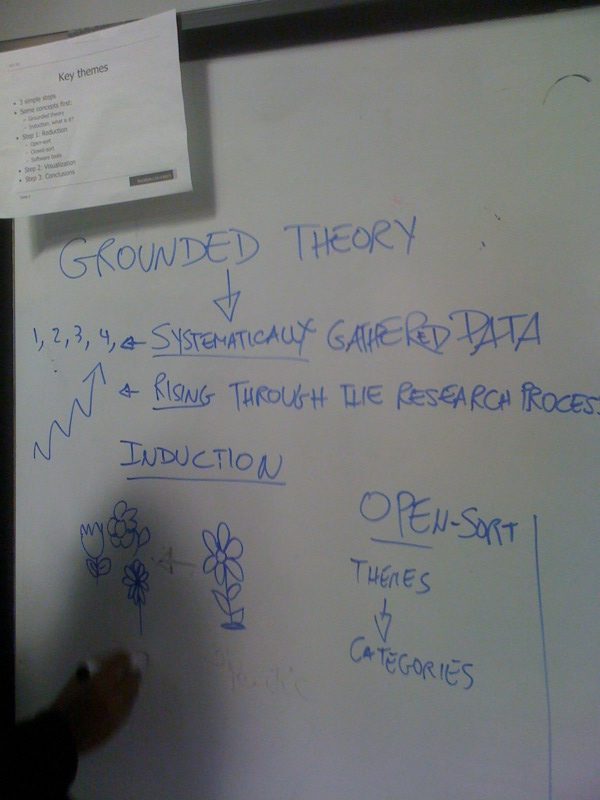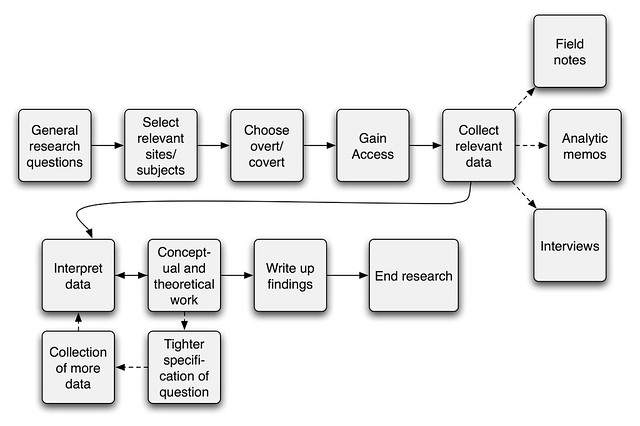Difference Between Grounded Theory and Ethnography
Grounded theory and ethnography are useful in qualitative studies in various social science fields. They are both systematic and inductive approaches in exploring cultural phenomena. However, grounded theory is firmly based on symbolic interaction with a new theory as an end result while ethnography has several forms with more holistic views. The following discussions further tackle such distinctions.

What is Grounded Theory?
Grounded theory is a methodical and inductive approach in gathering and analyzing emerging patterns in data. It seeks to interpret how human beings understand their world and the other beings who interact with them. Hence, the job of the grounded theorist is to verify the research participants’ reality and look into the socially-shared meanings which influence behaviors.
This is credited to American sociologists, Barney Glaser, and Anselm Strauss. With their research on dying patients, they developed the constant comparative method which evolved to grounded theory method. The following are the usual steps in grounded theory research:
- Question or collection of qualitative data
- Review of collected data
- Coding of themes which have been extracted
- Grouping of codes into concepts and then into categories
- A new theory is conceptualized from the categories
The advantages of this theory include its organized and clear presentation, the liberty to be able to construct theories, and its applicability in various fields such as psychiatry, psychology, sociology, medicine, management, industry, and education. Hence, it has high ecological validity, novelty, and parsimony.

What is Ethnography?
Ethnography came from the Greek words “ethos” which means “folk” or “nation” and “grapho” which means “write”. It is the methodological study of people and cultures which entails the researcher to observe participants from their perspectives. This design has many forms which includes life history, feminist, and confessional; two of its common forms are realist and critical. Realist ethnography uses a traditional approach from the third person’s perspective to promote objectivity. This is often used by cultural anthropologists and the researcher has the final say on how the information should be presented and interpreted. Critical ethnography advocates the causes of marginalized groups and aims to empower people. These ethnographers are usually politically minded and address issues on power, inequity, and repression.
The group’s culture is presented graphically and in writing; thus, ethnography can have a double meaning. The conceptual development of ethnography is attributed to Gerhard Friedrich Muller, a history and geography professor while the first known modern ethnographer is Bernardino de Sahagun, a Franciscan priest.
As a qualitative method, it observes practices and relationships without the strict employment of a deductive framework. An ethnographic study features the system of meanings in the existence of a cultural group. It is most appropriate for exploring beliefs, issues, language, and other cultural systems. The following are the general methods in conducting an ethnographic research:
- Evaluation if ethnography is the most suitable approach
- Identifying and locating the most appropriate group
- Selection of cultural themes, theories, or issues
- Determine which ethnography type to utilize
- Information collection
- Data analysis
- Generalizations of the participants’ and researchers’ views
Difference between Grounded Theory and Ethnography
Philosophical Perspective
Grounded theory is greatly influenced by symbolic interaction which seeks to gain more knowledge about the world by looking into how humans interact, specifically with the use of symbols such as language. On the other hand, ethnography is more holistic in approach and is not often assessed regarding philosophical standpoints.
General Aim
The general aim of grounded theory is to study emerging patterns which lead to a theory while that of ethnography is to gain rich and holistic generalizations of a group’s behavior and their location.
Proponent
Grounded theory is credited to American sociologists, Barney Glaser, and Anselm Strauss while ethnography’s concept development is attributed to Gerhard Friedrich Muller while the first known modern ethnographer is Bernardino de Sahagun.
Forms
Grounded theory has no distinct forms while ethnography has several which includes life history, feminist, and confessional; two of its common forms are realist and critical.
Methods
The usual steps in grounded theory research are data collection and review, theme coding, categorizing codes, and theory conceptualization while those of ethnography are population identification, theme selection, ethnography type specification, data collection and analysis, and generalizations.
Advantages
The advantages of grounded theory include high ecological validity, novelty, and parsimony. Regarding ethnography, the benefits include addressing unpopular or ignored issues, and providing avenues for ethnographer’s creativity.
Disadvantages
The criticisms of grounded theory include its being misunderstood as a “theory”, its vague notion of being “grounded”, and some have misgivings regarding its claim to develop inductive knowledge. The disadvantages of ethnography include the risk for bias since the ethnographer’s intuitions are tapped, its long duration and high cost since it may take time to establish trust with the participants, and some groups may be difficult to access.
Grounded Theory vs Ethnography: Comparison Chart

Summary of Grounded Theory vs Ethnography
- Both are systematic and inductive approaches in exploring cultural phenomena
- Grounded theory is based on symbolic interaction theory while ethnography is more holistic in approach.
- Grounded theory aims to identify emerging patterns and to conceptualize a theory while ethnography seeks to generate holistic etic and emic insights.
- Unlike grounded theory, ethnography has distinct forms.
- The advantages of grounded theory include high ecological validity, novelty, and parsimony while those of ethnography include addressing unpopular or ignored issues, and providing avenue for ethnographer’s creativity.
- Difference Between Hematoma and Melanoma - February 9, 2023
- Difference Between Bruising and Necrosis - February 8, 2023
- Difference Between Brain Hematoma and Brain Hemorrhage - February 8, 2023
Search DifferenceBetween.net :
 Email This Post
: If you like this article or our site. Please spread the word. Share it with your friends/family.
Email This Post
: If you like this article or our site. Please spread the word. Share it with your friends/family.
2 Comments
Leave a Response
References :
[0]Birks, Melanie and Mills, Jane. Grounded Theory: A Practical Guide. Thousand Oaks, CA: Sage, 2015. Print
[1]Fetterman, David. Ethnography: Step by Step. Thousand Oaks, CA: Sage, 2010. Print.
[2]Ladner, Sam. Practical Ethnography. New York, NY: Routledge, 2014. Print.
[3]Image credit: https://www.flickr.com/photos/96691515@N00/3051151604
[4]Image credit: https://www.flickr.com/photos/96691515@N00/3006848248


In the write-up, you mentioned that grounded theory does not have a distinct form but ethnography does and you attributed Feminist, life history, confessional, ….to ethnography. However, this information was/is interchanged in the comparison chart. Kindly check. Thanks.
I find your write up very educative.